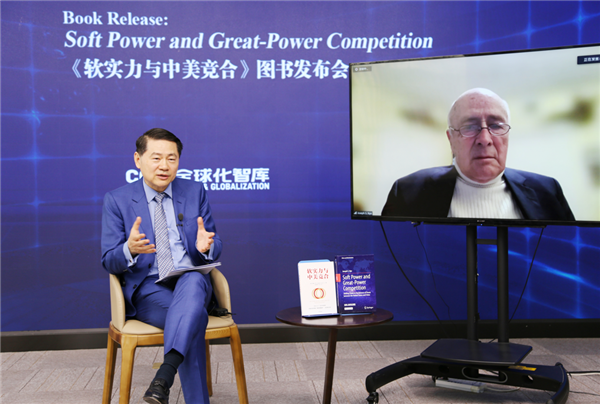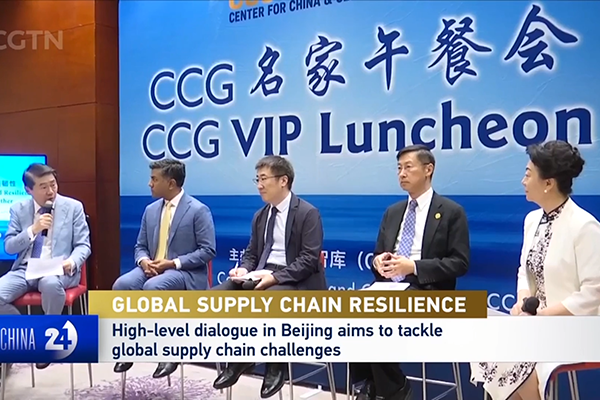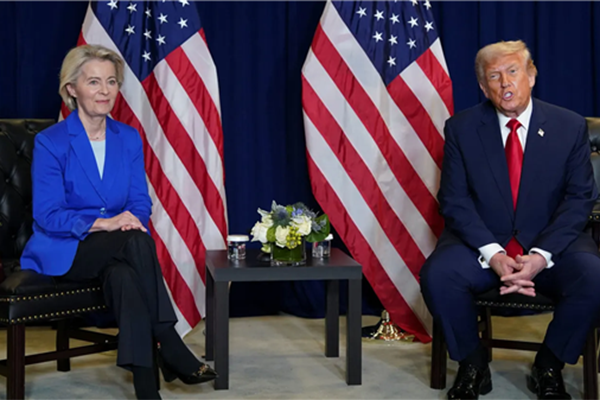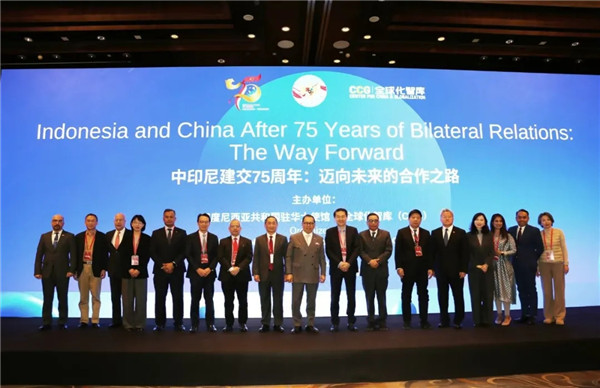The real existential danger is if US, China ‘blunder into war’
April 29 , 2023Wang Huiyao, CCG founder and president, talks with Joseph S. Nye Jr., former dean of the Harvard Kennedy School of Government, on April 28.
Editor’s Note:
China does not pose an existential threat to the US, the real existential danger is “if we blunder into war,” Joseph S. Nye Jr., former dean of the Harvard Kennedy School of Government who coined the term “soft power,” said during the release of his new book, Soft Power and Great-Power Competition: Shifting Sands in the Balance of Power Between the United States and China, on Friday, hosted by Beijing-based think tank Center for China and Globalization (CCG). During the book release, Wang Huiyao, CCG founder and president, had one hour dialogue with Nye, in which Wang raised two questions on behalf of Global Times. This is an excerpt of the dialogue.
Wang: We are facing an unprecedented global situation, with growing great power rivalry and competition. Against this backdrop, how can we make things work between China and the US, to have more convergences rather than divergences, from the perspective of soft power? And how can we improve cooperation between the two?
Nye: I would say that there are aspects of soft power, which are part of the competition… (For instance,) China supports projects in Africa, and the Belt and Road Initiative is designed to make China more attractive. Similarly, when the US Agency for International Development (USAID) supports a project in Africa, that is designed to make the US more attractive. That aspect of soft power can be part of the rivalry. It is competitive.
On the other hand, there’s an aspect of soft power which can be a joint gain. And that’s when China feels more attractive to the US and the US feels more attractive to China. That’s the thing that will enhance our ability to cooperate. Our ability to compete is quite obvious. There’s too much of it right now. The question is, how can we increase our ability to cooperate? (I am a believer in) people-to-people contact – more students, more journalists, more tourists. I think these visits in both directions are helpful in developing soft power. It’s not that one doesn’t complain about the other country, but one understands the other country. It’s harder to demonize other people, if you actually have personal contact with them.
Wang: In our conversation a year ago, you raised a 20-year cycle when discussing China-US ties. You said now we are in a very difficult, challenging time, but maybe in 15 or 20 years, we will reach a new equilibrium. How can we overcome the current challenging period?
Nye: If we look back on US-China relations since 1949, the first two decades were open hostility. We even fought each other on the Korean Peninsula. That is followed by the period in the 1970s and early 1980s where after Richard Nixon and Mao Zedong met, where the US and China cooperated, because of concern about the Soviet Union. That was followed by, under the economic policies of Deng Xiaoping, a period of economic engagement. That period of engagement continues up until about 2015 or 2016 when the stress or emphasis became on great power competition. Roughly speaking, these different periods have been a decade or two each.
Now, if you take this most recent period from about 2016 or 2017, we’re six or seven years into the current period of great power competition. Who knows whether it will take one or two decades for us to see our way through this. History is not deterministic and we can also make mistakes of making decisions to push things in the wrong directions. I think in this current period, the important thing will be to realize there will be competition. But it’s important to have guardrails on the competition to make sure that we have constant communication with each other at the highest levels that we understand what each other’s red lines are, and also understand how to avoid getting ourselves into a crisis.
I think the current period of great power competition is likely to last for a decade or so, but nobody can be sure. But we have to make sure that we wind up working together to make sure that we don’t go off the road.
Wang: Unlike the hype from some other American politicians and observers, you stress that China does not pose an existential threat to the US. What is your argument to back up this stance?
Nye: Let me start with the basic question of whether the US poses a threat to the existence of China and whether China poses a threat to the existence of the US. My answer to that is no. China is too big for the US to change or control. The US is too big for China to change or control.
The only way in which we can destroy each other’s country or basically being a threat to each other’s existence is if we blunder into war. If you look through history, the threats that some people in America are thinking about, are China attacks the US like Japan attacked Pearl Harbor in 1941. That to me is not the threat that China poses to the US.
A threat is more like that in 1914, in which European great powers, thought their troops would be home by Christmastime and everything would clear up. Instead, they wind up with four years of terrible war, which killed over 10 million people and destroyed four empires. To me, an existential danger for each other is that we blunder like 1914.
That’s why guardrails are so important to get cooperation going. We’re going to have more meetings like the one that President Xi and President Biden had in Bali in a more regular, not occasional way, in which they indicate that they want two societies, two governments, to set up communication, and guardrails.
From Global Times, 2023-4-29








